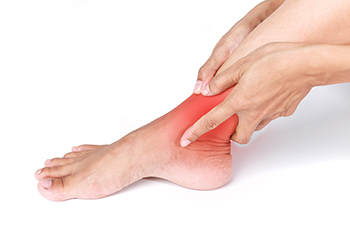Ankle pain can be caused by a variety of factors. For instance, you may have an ankle sprain or fracture. Ankle sprains occur when ligaments that support the ankle get stretched or torn, and fractures are actual breaks in one or more bones that make up the ankle joint. Pain in the ankle may also be caused by gout, rheumatoid arthritis, osteoarthritis and other types of arthritis which affect the ankle joint. There are other conditions such as nerve injuries, heel injuries, and blockages in blood vessels that may produce ankle pain. Pain due to tarsal tunnel syndrome (a compression of the tibial nerve in the tarsal tunnel) can be felt anywhere along the nerve, including the ankle. There may be painful damage to the cartilage or tendons in the ankle. If you are feeling pain in your ankle, get your condition evaluated and diagnosed by a podiatrist who can also create a treatment plan based on their findings.
Ankle pain can have many different causes and the pain may potentially be serious. If you have ankle pain, consult with one of our podiatrists from Foot & Ankle Associates of Maine. Our doctors will assess your condition and provide you with quality foot and ankle treatment.
Ankle pain is any condition that causes pain in the ankle. Due to the fact that the ankle consists of tendons, muscles, bones, and ligaments, ankle pain can come from a number of different conditions.
Causes
The most common causes of ankle pain include:
- Types of arthritis (rheumatoid, osteoarthritis, and gout)
- Ankle sprains
- Broken ankles
- Achilles tendinitis
- Achilles tendon rupture
- Stress fractures
- Tarsal tunnel syndrome
- Plantar fasciitis
Symptoms
Symptoms of ankle injury vary based upon the condition. Pain may include general pain and discomfort, swelling, aching, redness, bruising, burning or stabbing sensations, and/or loss of sensation.
Diagnosis
Due to the wide variety of potential causes of ankle pain, podiatrists will utilize a number of different methods to properly diagnose ankle pain. This can include asking for personal and family medical histories and of any recent injuries. Further diagnosis may include sensation tests, a physical examination, and potentially x-rays or other imaging tests.
Treatment
Just as the range of causes varies widely, so do treatments. Some more common treatments are rest, ice packs, keeping pressure off the foot, orthotics and braces, medication for inflammation and pain, and surgery.
If you have any questions, please feel free to contact our office located in Brunswick, ME . We offer the newest diagnostic and treatment technologies for all your foot care needs.

